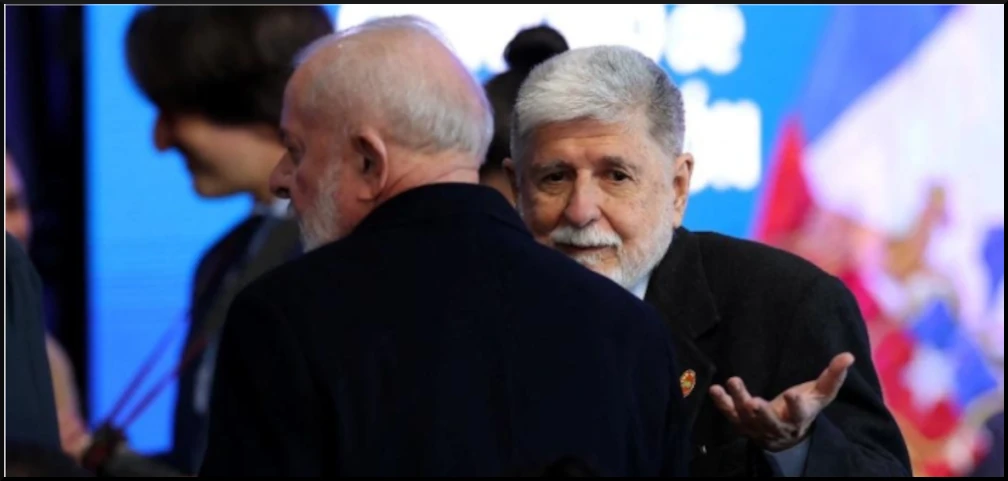by Misión Verdad Orinoco Tribune, published on Popular Resistance, October 24, 2024
Looks like Lula Inácio da Silva’s “Get Out of Jail Free” card was not free, after all. Too bad for Venezuela ….and Brazil.
On Monday, it was reported that Brazil would oppose Venezuela’s entry into the BRICS group. The 16th Summit of the BRICS organization is taking place this week in the Russian city of Kazan. President Nicolás Maduro was invited by the Russian president himself, Vladimir Putin, at the beginning of August, and is attending with a Venezuelan delegation.
The Brazilian government’s advisor for international affairs, former foreign minister Celso Amorim, announced that Brazil would seek to prevent Venezuela from joining BRICS. The instruction to veto Caracas’s possible accession came from Brazilian President Luiz Inácio Lula da Silva.
In Latin America, in addition to Bolivia, Cuba, and Nicaragua, Venezuela had submitted a formal request to join the alliance of emerging economies. Among all the applicants, Venezuela is the country that has gathered the greatest support for its entry after strengthening its cooperative relations with the most important members of the bloc—Russia and China.
Amorim argued that this was not a question of moral or political judgement: “The BRICS have countries that practice certain types of regimes, and other types of regimes; the question is whether they have the capacity, due to their political weight and capacity for relations, to contribute to a more peaceful world.”
The advisor’s statement was marked by ambiguity. On the one hand, he pointed out that the Kazan Summit should not have a rigid rule for integrating future partners, since, in his opinion, it should be open to states that promote development and changes in global governance. At the same time, he publicly announced that he does not support Venezuela’s entry.
However, this stance is in line with the increasingly hostile attitude that Lula’s government has shown towards Venezuela in recent months, after it questioned the results of the June 28 elections, in which President Nicolás Maduro was re-elected.
Although Brazil initially tried to maintain a relative neutrality, seeking to establish itself as a mediator in the post-electoral conflict, it has gradually become more aligned with the position of Washington and Brussels, which openly recognize Edmundo González as the supposed winner of the day.
Causes and reasons
The first thing to note is that last year, Lula himself was open to the expansion of the BRICS and the inclusion of Venezuela. Amorim’s statement, in this regard, represents an aggressive change of position that deteriorates the Caracas-Brasilia relationship.
“I am in favor of Venezuela joining the BRICS. We will meet soon and we have to evaluate several requests for integration,” Lula said in May, adding that “the new geopolitics is characterized by two elements: the unity of our America in diversity and the role of the BRICS, which is emerging as the great magnet for countries that want cooperation.”
It is worth remembering that last year, Brazil also pushed for Argentina’s entry into the bloc, but once Javier Milei came to power, the application for membership in the bloc was terminated.
Strategically, Brazil is interested in retaining its position as the only Latin American member of the BRICS, a position that allows it to avoid geopolitical counterweights and, at the same time, protect its monopoly on the conduct of regional affairs from the rest of the powers in BRICS.
In fact, the proposal to include Argentina was based on the premise that Brasilia would manage the timing and scope of Buenos Aires’ accession and would position it as the little brother of the Brazilian giant within the alliance.
But with Venezuela, different logics and tensions operate.
According to the geopolitical conception of Planalto and Itamaraty, Venezuela’s participation in the BRICS would shift the geopolitical axis of the region and the bloc too much towards multipolarity due to the strengthening of ties with Russia and China. This would weaken Lula and Amorim’s approach to preserving Brazil’s strategic ties with Washington and Brussels while safeguarding its economic ties with BRICS.
In this sense, Venezuela could become an uncomfortable ally within the group, which could not be controlled like Argentina and which would encourage a strengthening of multipolarity against the current of Brazilian foreign policy, marked by an emphasis on ties with the West.
The existential conflict between Caracas and Washington, which could deepen after the US presidential elections in November, would mean that Brazil would have to support its Venezuelan partner in the BRICS in opposition to Washington.
Since both are part of the group, Brazil would be obliged to maintain an active political and economic relationship with Venezuela and thus challenge the illegal sanctions and the narrative of not recognizing the presidency of Nicolás Maduro promoted by the White House and the US State Department.
Lula and Amorim have perceived these potential dilemmas, which is why they have decided to oppose Venezuela’s incorporation with a view to reducing any political cost that would imply twisting or complicating the relationship with the US.
In the face of such opposition, the Brazilian president and his main advisor on international affairs claim that their vision is more Eurocentric than multipolar, and that BRICS is an instrument for economic purposes rather than a geopolitical gamble determined to build a new global order, a horizon towards which Venezuela is heading and which it actively promotes.
This clash of visions and the non-negotiable points of Brazilian foreign policy with the United States explain the latest Brazilian grievance against Venezuela.
*Featured Image: Brazilian government advisor for international affairs and former foreign minister, Celso Amorim, with Brazilian President Luiz Inácio Lula da Silva. Reuters.
